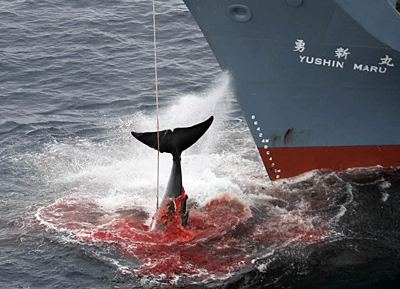 There have been times when factions of the conservation movement have been dismissed as too rabid to be taken seriously and at times that extremism ends in a situation being worse than it would otherwise have been. Japanese whaling suffers from the green extreme effect. It would have been reduced long ago if the tactic hadn’t been to oppose it in total. So whales continue to be removed at a rate that is way too high. For that you can thank the Green Extreme.
There have been times when factions of the conservation movement have been dismissed as too rabid to be taken seriously and at times that extremism ends in a situation being worse than it would otherwise have been. Japanese whaling suffers from the green extreme effect. It would have been reduced long ago if the tactic hadn’t been to oppose it in total. So whales continue to be removed at a rate that is way too high. For that you can thank the Green Extreme.
The current discussion around the marine protection area proposed for the Ross Sea Region (not solely the Ross Sea) is suffering from the same rabid ideology. At risk is the prospect of no MPA being declared and the region being all the worse for that development. For that part of the world all of the members of CCAMLR, whether fishing nations or not must reach a consensus. Hardline radicalism will prevent that and as a result no MPA will result. That would be as tragic as the balls up with whaling.
The Green Extreme suffer from a number of deficiencies, the major of which is a refusal to recognise that conservationism comes at a cost, a cost that not all stakeholders are always prepared to pay. To be extreme if we’d never had anything but conservation then we’d still be in caves, this logical endpoint of the Green Extreme argument is what renders emotively-charged, logically-light entrenchment of an ideology, irrelevant.When it comes to the Ross Sea one of the most pathetic claims heard from greennecks is that the area is “pristine”. The fact whaling only ceased down there in 1986 apparently has had no impact on the ecosystems. Find any cited marine biologist that can substantiate that claim if you can. That’s how silly their arguments are – and they get worse. Apparently climate change has also left the area “pristine” as well. That’s just nuts – you look at the number of times glaciers have scraped the sea floor there over the paleo period and the ecosystems have re-established, you realise that the only constant is change. “Pristine” indeed.
There is a real world the Green Extreme doesn’t inhabit. It comprises nations, many of whom aren’t members of CCAMLR or similar treaties. Why on earth would they take any notice of some selective morality from a bunch of well-to-do ideologues? They won’t, so the result of no international agreements which an ideological divide would lead to, would be a free-for-all.
Conservation is not of course the only issue where nutters inhabit the fringes. I remember when we did our book on climate change how the deniers simply would not engage in the intellectual discussion, for them it was a belief and that was the end of it. Or when we did our book on New Zealand’s fisheries management regime how the rednecks argued that they were entitled to take as many fish from the sea as they chose, it was some sort of birthright, So it is with conservation it seems, there is a lunatic fringe that gets far more airplay than it should. The cutting edge of conservation is establishing the reasoning to demonstrate that the costs of not conserving exceed the benefits. That’s where the rubber hits the road and the real work is done. Lazy, slogan-chanting “believers” don’t cut the mustard in this world though – it requires effort. At some point the cost of a conservation initiative will exceed the benefit. That point defines the limits of where conservation yields a net benefit and protagonists and antagonists on that initiative should be aware of that. Then we would have a considered debate. Making movies of scenery and taking air brushed pictures of cute animals is no substitute for analysis.
It is unfortunate that the Ross Sea banner-wavers have not managed to produce science that withstands scrutiny, and in fact was rubbished by the scientific committees of CCAMLR. That further weakens their already-shaky set of arguments for a total moratorium. So long as the Green Extreme is typified by such entrenched religiosity and devoid of analytical method, it poses little but a risk of standoff between nations and considerable more damage to the environment. How ironic.
There are a heap of conservation projects being done and many more out there waiting to be done. The last thing considered conservationists need is green-necks claiming their stance is defensible. They’re an embarrassment.
For a summary of the debate around the Ross Sea and conservation see the following;
Mar 27 2012 http://www.nzherald.co.nz/business/news/article.cfm?c_id=3&objectid=10794785
Apr 2 2012 http://www.nzherald.co.nz/nz/news/article.cfm?c_id=1&objectid=10796024
Apr 17 2012 http://www.nzherald.co.nz/business/news/article.cfm?c_id=3&objectid=10799331
Apr 24 2012 http://www.nzherald.co.nz/business/news/article.cfm?c_id=3&objectid=10800935
Apr 24 2012 http://www.nzherald.co.nz/nz/news/article.cfm?c_id=1&objectid=10800934
Apr 24 2012 http://www.nzherald.co.nz/opinion/news/article.cfm?c_id=466&objectid=10800944

